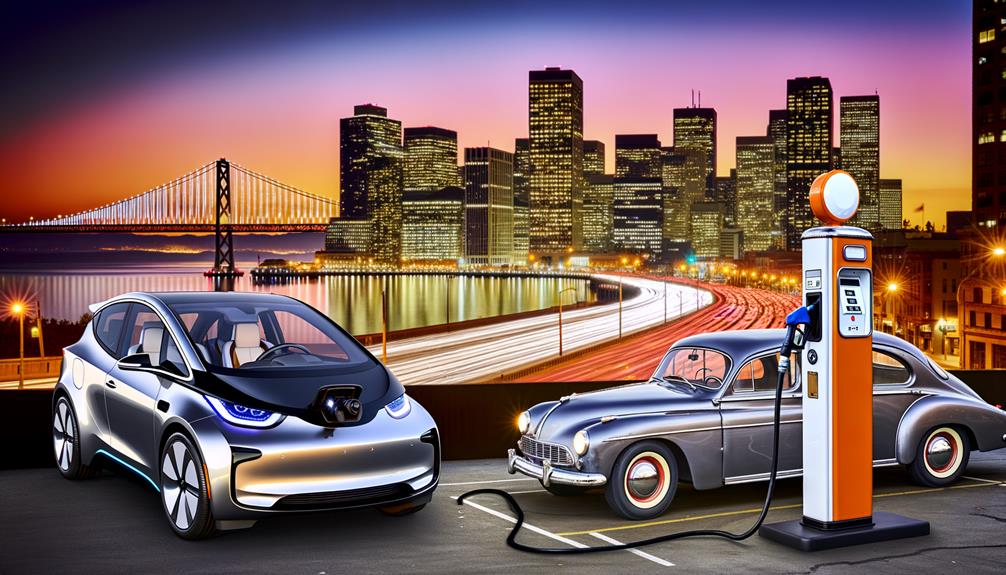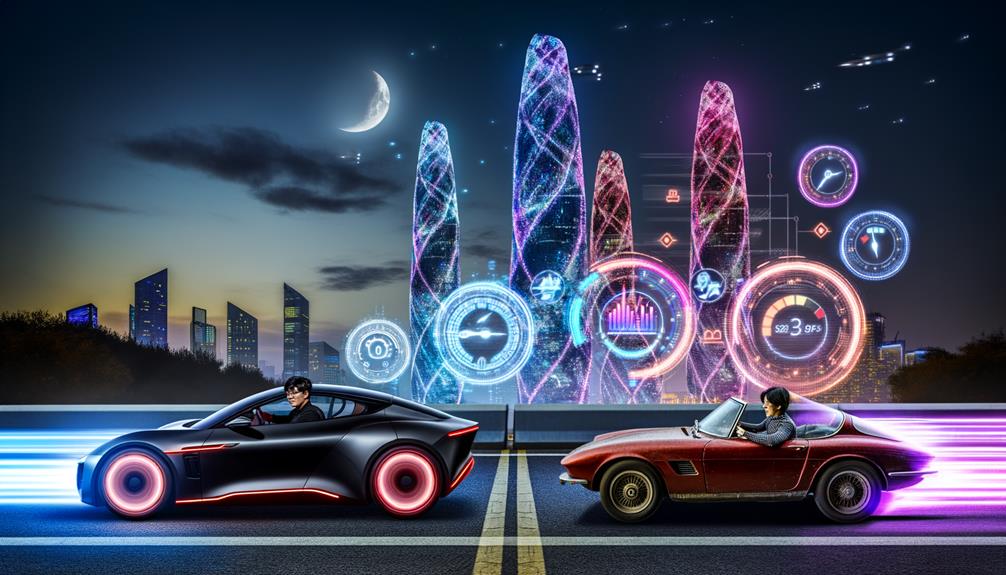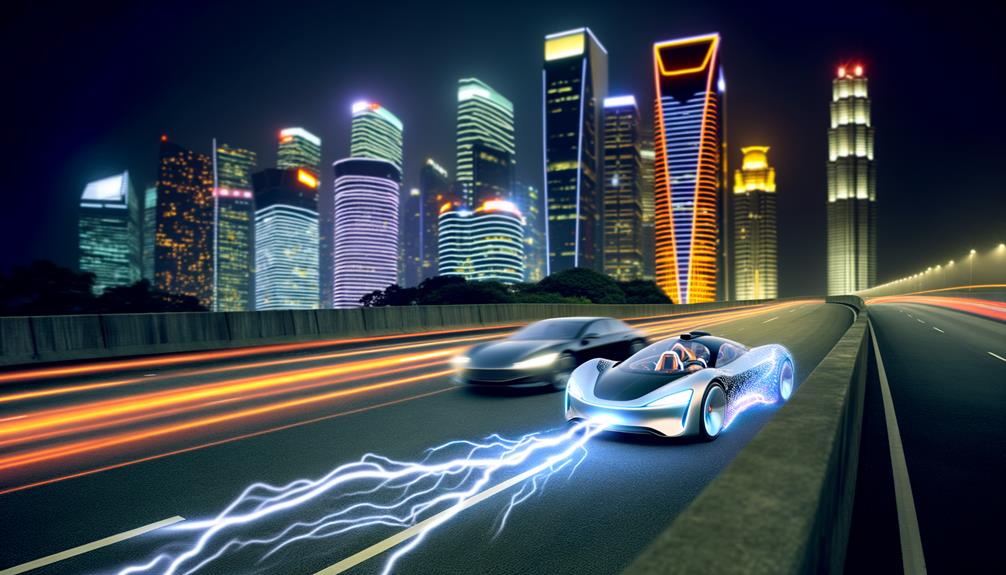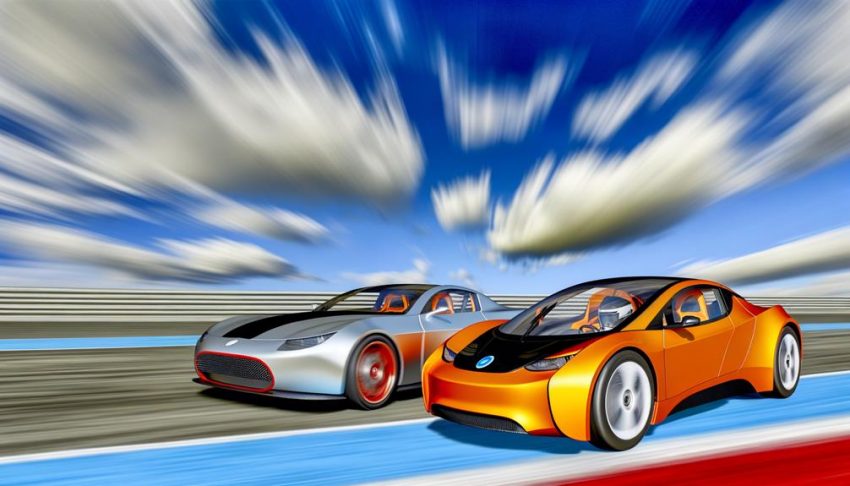When you think about speed and acceleration, you might wonder if electric cars can really outpace their petrol counterparts. You've probably heard that electric vehicles like the Tesla Model S can go from 0 to 60 mph in just a few seconds, thanks to the instant torque from electric motors. But is it all about acceleration, or are there other factors at play? What about long-term performance, efficiency, and the overall driving experience? There's more to this comparison than meets the eye, and understanding the nuances could change your perspective on the future of driving.
Contents
Speed and Acceleration
When it comes to speed and acceleration, electric vehicles (EVs) clearly have the edge over petrol cars. EVs can accelerate from 0 to 60 mph in as little as 2.275 seconds, a figure that outpaces many gas-powered supercars. For example, the 2019 Dodge Challenger, a high-performance internal combustion engine car, takes 3.4 seconds to achieve the same speed. This significant difference puts EVs in a class of their own when it comes to acceleration.
One of the primary reasons EVs excel in acceleration is the instant torque provided by electric motors. Unlike internal combustion engine (ICE) vehicles, which need time to build up power through multiple gears, electric vehicles deliver power immediately. This instant torque results in quicker acceleration from a standstill, making EVs superior in short-distance speed bursts.
Performance models of both EVs and gas cars can achieve impressive acceleration times, often under 4 seconds from 0-60 mph. However, EVs like the Tesla Model S frequently outperform many gas sports cars, showcasing their superior acceleration capabilities. The design of EVs, which often includes a single gear transmission, facilitates more efficient energy transfer from the battery to the wheels. This streamlined process contrasts with the traditional multi-gear systems in gas-powered vehicles, allowing for quicker and smoother acceleration.
Additionally, EVs experience less energy loss during operation due to fewer moving parts and an energy utilization rate of 85%-90%. In comparison, gas vehicles operate at a much lower efficiency of 17%-21%. This efficiency boost further enhances the acceleration capabilities of electric vehicles, solidifying their position as the faster option in the automotive world.
Efficiency Metrics
Examining efficiency metrics reveals a stark contrast between electric vehicles (EVs) and petrol cars. When efficiency is measured regarding how well energy is converted to movement, EVs stand out. Electric vehicles convert over 60% of electrical energy from the grid to power at the wheels. In comparison, gas vehicles only convert about 20% of the energy stored in gasoline to motion. This striking difference underscores why EVs are considered more energy-efficient.
Additionally, EVs utilize approximately 85%-90% of their energy for movement, thanks to fewer moving parts and advanced technologies like regenerative braking, which recaptures energy usually lost during braking. On the other hand, internal combustion engines in gas vehicles typically convert only 17%-21% of energy into motion, making them far less efficient.
This higher efficiency translates to significant cost savings. The average annual fueling cost for an electric vehicle is estimated at around $485, which is about 60% less than the average annual gasoline cost of $1,117 for gas vehicles. Moreover, because EVs have fewer moving parts, they require less maintenance. Maintenance costs for EVs are typically about one-third of those for equivalent gasoline cars, as they don't need oil changes or other engine-related services.
Charging and Refueling

While electric vehicles (EVs) clearly outperform petrol cars regarding efficiency, the experience of charging versus refueling presents different challenges. Charging an EV can range from a swift 30 minutes to several hours, depending on the type of charger and the vehicle's battery size. Fast chargers, for instance, can provide up to 80% charge in about 30 minutes, which considerably reduces the time compared to traditional home charging methods. However, this still doesn't match the convenience of refueling a gas-powered vehicle, which typically takes around 5 minutes at a gas station.
Home charging stations offer the convenience of overnight charging, allowing you to wake up to a fully charged car. However, these stations require installation time and an investment, usually around $2,000. This is a one-time cost but remains a barrier for some potential EV owners. On the other hand, refueling a gas vehicle doesn't require any additional setup or costs beyond the fuel itself.
The availability of public charging stations is increasing but still lags behind the extensive network of gas stations. This disparity can impact long-distance travel plans, as finding an EV charger might be more challenging, especially in less urbanized areas. While advancements in EV technology continue to reduce charging times, the widespread infrastructure for gas refueling provides unmatched convenience.
Environmental Impact
When comparing electric cars to petrol cars, you'll notice a significant difference in emissions and air quality. Electric vehicles produce zero tailpipe emissions, reducing harmful pollutants, while petrol cars emit CO2 and other pollutants that contribute to climate change. Integrating renewable energy into the power grid further enhances the environmental benefits of EVs, highlighting their potential to lower overall lifecycle emissions.
Emissions and Air Quality
Electric cars, producing zero tailpipe emissions, hold a notable advantage over petrol cars in reducing air pollutants like nitrogen oxides and particulate matter. Unlike petrol cars, which emit CO2 and other harmful gases, EVs help improve air quality, particularly in urban areas. When powered by renewable sources, the lifecycle emissions of EVs are even lower, potentially emitting up to 50% less CO2 over their lifetime.
The transportation sector is the largest source of greenhouse gas emissions in the U.S., so shifting to EVs could greatly impact air quality and climate change mitigation. As more cities adopt EVs, improvements in air quality and reductions in smog levels have been reported, leading to better public health outcomes by minimizing respiratory and cardiovascular diseases linked to air pollution.
Incentives and regulatory measures are essential for pushing the adoption of EVs:
- Reduction in tailpipe emissions
- Improved urban air quality
- Lower lifecycle CO2 emissions with renewable sources
- Decreased greenhouse gas emissions from the transportation sector
- Enhanced public health due to reduced pollutants
As countries aim to ban new petrol vehicle sales within the next decade, EVs stand as a key solution for enhancing air quality and reducing emissions.
Renewable Energy Integration
Harnessing renewable energy for electric vehicles (EVs) isn't just a technological advancement; it's a vital step in reducing environmental impact. By producing zero tailpipe emissions, EVs play an essential role in decreasing air pollution and fostering cleaner urban environments. When you charge your EV using electricity generated from renewable energy sources like solar or wind, the lifecycle emissions of your vehicle are markedly lower compared to gasoline vehicles. This shift not only reduces your carbon footprint but also supports broader environmental goals.
Integrating EVs with renewable energy systems optimizes energy use. Smart charging technologies enable your EV to charge during periods of high renewable energy production, making the process more efficient and sustainable. As the share of renewables in the energy grid increases, the carbon footprint of EVs continues to decline, solidifying their status as a leading option for sustainable transportation.
Regulatory incentives and advancements in renewable energy technologies are driving this change. By choosing an EV, you're contributing to a more sustainable transportation ecosystem and reducing the global dependency on fossil fuels. This integration is key to achieving fewer emissions and a healthier planet.
Market Trends

You'll notice that electric vehicle sales are skyrocketing, with a projected 40% annual increase, while traditional gasoline car sales are declining. Major automakers are shifting their investments towards electric technology, driven by both regulatory incentives and consumer demand for cleaner transportation. As new EVs become more affordable, the market landscape is clearly favoring electric over petrol cars.
Rising EV Sales Rates
The surge in electric vehicle (EV) registrations, which jumped by 60% in the U.S. during Q1 2022, underscores a dramatic shift in market trends towards sustainable transportation. This growth signifies that more consumers are evaluating the benefits of electric cars vs gas-powered cars.
When it comes to performance, EVs often boast superior top speeds and instant acceleration, outpacing many traditional gas-powered cars. The price tag for EVs might still be higher upfront, but lower operating and maintenance costs make them an attractive long-term investment.
Several factors are driving this shift:
- Consumer Preference for Sustainability: People are increasingly motivated by environmental concerns.
- Lower Operating Costs: EVs are cheaper to fuel and maintain, offsetting their initial price tag.
- Government Incentives: Subsidies and tax breaks make EVs more accessible.
- Automaker Investment: Major companies are pouring resources into EV development.
- Technological Advances: Improvements in battery technology and charging infrastructure enhance EV appeal.
EVs currently represent 4.6% of the new-car market, with projections showing robust growth as nations target 100% electric car sales by 2030 or 2040. With sales expected to rise by 40% annually, the shift towards electric mobility is unmistakable.
Declining Gas Car Sales
As electric vehicle (EV) sales surge, the decline in gas-powered car sales becomes increasingly evident. With EV sales projected to grow rapidly at a rate of 40% annually, it's clear that consumer preferences are shifting towards cleaner transportation options. This trend is not just a consumer-driven phenomenon; many countries are also aiming to ban the sale of new gasoline vehicles by 2030 or 2040. Such regulatory measures further underscore the global push towards electric mobility.
In the U.S., electric vehicles now represent 4.6% of the new-car market, an indicator of growing acceptance and demand for these top vehicles. This shift is particularly pronounced in regions offering strong incentives for electric vehicle adoption, where declining gas car sales reflect consumers' priorities towards sustainability and environmental responsibility. Major automakers are keenly aware of this trend and are investing heavily in EV technology and infrastructure, accelerating the change away from gas cars.
Ultimately, the landscape of the automotive market is undergoing a significant transformation. As EV technology continues to improve and incentives become more prevalent, the decline in gas car sales is likely to become even more pronounced, pointing towards a future dominated by electric vehicles.
EV Technology Investments
Although consumer demand for sustainable transportation is a significant driver, it's the substantial investments in EV technology by major automakers that are truly shaping the market's future. Companies are pouring billions into research and development to enhance battery efficiency and charging infrastructure. This financial commitment is vital for the projected 40% annual growth in the global electric vehicle market.
Automakers aren't the only ones making strides; companies like Wallbox are innovating in smart charging solutions. These advancements allow you to charge at home more efficiently, often integrating renewable energy sources. Additionally, there's a growing focus on building fast-charging networks to support the expanding fleet of EV models.
Government regulations and incentives are also pushing the industry towards electric vehicle production. Many countries aim for 100% electric car sales by 2030 or 2040, further accelerating the shift away from fossil fuels.
Key investment areas include:
- Battery efficiency improvements
- Expansion of public charging stations
- Development of plug-in hybrid technologies
- Integration of renewable energy in charging solutions
- Regulatory compliance and incentives
These strategic investments are fundamental for delivering maximum torque and performance, making electric vehicles increasingly competitive against traditional petrol cars.
Power and Performance
Electric cars are rapidly proving their superiority over petrol cars regarding power and performance. One of the key factors behind this advantage is the efficiency of electric motors. Unlike petrol engines, which convert only 17%-21% of the energy stored in gasoline into motion, electric motors achieve an impressive 85%-90% energy conversion rate. This efficiency translates directly into better performance on the road.
The instant torque provided by electric motors is another essential aspect. While petrol engines require time to reach peak torque, electric vehicles (EVs) deliver it instantaneously. This means rapid acceleration from a standstill, a feature epitomized by the Tesla Model S, which can go from 0 to 60 mph in as little as 2.275 seconds. This kind of acceleration is hard to match, even by high-performance petrol cars.
Here's a comparison table to illustrate these points:
| Metric | Electric Cars | Petrol Cars |
|---|---|---|
| Energy Conversion | 85%-90% efficient | 17%-21% efficient |
| Torque Delivery | Instant | Delayed |
| Acceleration (0-60) | As fast as 2.275 sec | Typically slower |
| Gear Changes | None (single-gear) | Multiple gears |
| Driving Experience | Smooth, seamless | Can be jerky |
Electric cars also benefit from a single-gear transmission, eliminating the delays associated with gear changes in internal combustion engine vehicles. This seamless power delivery enhances the overall driving experience, making it smoother and more responsive.
Future of Electric Cars

Looking ahead, the future of electric cars is set to revolutionize the automotive industry. As countries target 100% electric vehicle (EV) sales by 2030 or 2040, annual EV sales are projected to increase by 40%. Major automakers are making significant investments in EV technology and infrastructure, aiming to enhance battery performance and charging capabilities. This shift not only promises a cleaner environment but also introduces several benefits over traditional gasoline cars.
New EV models are now achieving ranges that rival or exceed those of gasoline cars. For instance, the Tesla Model S Long-Range can travel up to 610 km on a single charge. This substantial progress in the number of miles that EVs can cover on a full charge is a critical factor for widespread adoption. Additionally, the expanding network of charging stations—over 190,000 in Europe by 2020—ensures that drivers can recharge conveniently.
Key advantages of EVs include:
- Lower maintenance costs: EVs have fewer moving parts than gasoline cars, reducing the need for regular maintenance.
- Environmental impact: Advancements in battery technology and recycling processes are making EVs more sustainable.
- Vehicle speed: Many new EVs offer impressive acceleration and top speeds comparable to high-performance gasoline cars.
- Infrastructure investments: The rapid expansion of charging stations supports the growing number of EVs.
- Government incentives: Many countries provide subsidies and tax benefits to encourage EV adoption.
Frequently Asked Questions
Do Electric Cars Accelerate Faster?
Yes, electric cars do accelerate faster due to instant torque and advanced technology. Despite battery weight, their performance metrics and urban efficiency provide a unique driving experience, showcasing significant advancements over traditional petrol cars.
Do Electric Cars Run Out Faster Than Gas Cars?
You might worry about battery depletion in electric cars, but their energy efficiency and lower fuel costs can offset this. Range anxiety is valid, though improving charging infrastructure and environmental impact considerations make EVs increasingly practical.
Are Electric Cars Faster Than Race Cars?
You'll find electric motors provide instant torque delivery, giving EVs an edge in acceleration. With advanced racing technology, battery performance, and track adaptations, electric cars are setting new speed records, rivaling top petrol race cars.
Are Gas or Electric Cars More Powerful?
You'll find electric cars generally more powerful due to instant torque, efficient power delivery, and superior performance metrics. Despite their weight impact, their energy efficiency and driving experience often outperform petrol cars. It's an impressive torque comparison.
Conclusion
In comparing electric cars to petrol cars, it's evident that EVs often excel in speed and acceleration due to their instant torque. While efficiency metrics and environmental benefits favor electric vehicles, charging infrastructure still lags behind traditional refueling. Market trends indicate a growing shift towards EVs, driven by advancements in power and performance. Ultimately, the future of electric cars looks promising as technology evolves, potentially making them the superior choice for both speed and sustainability.
